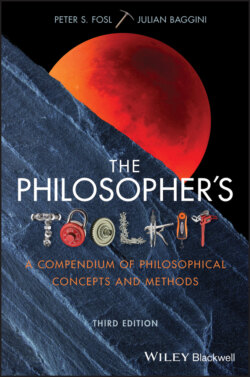Читать книгу The Philosopher's Toolkit - Julian Baggini, Julian Baggini - Страница 79
1.11 Certainty and probability
ОглавлениеSeventeenth‐century French philosopher René Descartes (1596–1650) is famous for claiming he had discovered the bedrock upon which to build a new science that could determine truths about the world with absolute certainty. The bedrock was an idea that could not be doubted, the cogito (‘I think’) – or, more expansively, as he put it in Part 1, §7 of his 1644 Principles of Philosophy, ‘I think therefore I am’ (‘cogito ergo sum’). Descartes reasoned that it is impossible to doubt that you are thinking, for even if you’re in error or being deceived or doubting, you are nevertheless thinking; and if you are thinking, you exist.
Ancient Stoics like Cleanthes (c.331–c.232 BCE) and Chrysippus (c.280–c.207 BCE) maintained that there are certain experiences of the physical and moral worlds that we simply cannot doubt – experiences they called ‘cataleptic impressions’. Later philosophers like the eighteenth century’s Thomas Reid (1710–96) believed that ordinary experience is improperly doubted and that God guarantees the veracity of our cognitive faculties. His contemporary, Giambattista Vico (1688–1744), reasoned that we can be certain about things artificial or human but not about the non‐human, natural world. More recently, the Austrian philosopher Ludwig Wittgenstein (1889–1951) tried to show how it simply makes no sense to say that one doubts certain things. Some purported doubts (e.g. about whether the external world exists) are, according to Wittgenstein, meaningless.
Others have come to suspect that there may be little or nothing we can know with certainty and yet concede that we can still figure things out with some degree of probability. Hellenistic Academic sceptics such as Arcesilaus (c.240–c.315 BCE) and Carneades (214–c.129 BCE) seem to have argued for this view. Before, however, you go about claiming to have certainly or probably discovered philosophical truth, it will be a good idea to give some thought to what each concept means.
